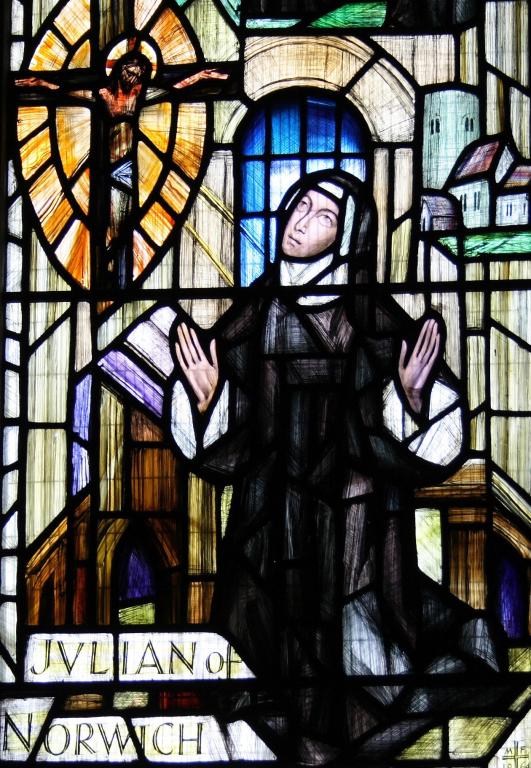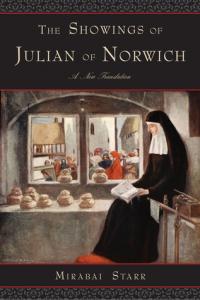
The great medieval mystic Julian of Norwich is renowned for her theological optimism (“All shall be well, and all shall be well, and all manner of things shall be well”) as well as for her willingness to color outside the gendered lines (“As truly as God is our father, so too is God our mother”).
She certainly demonstrated a clear contemplative sensibility (“The fullness of joy is to behold God in all”) — so it surprises me that more people do not think of her as a master teacher in the art of Christian prayer.
That may be because she is somewhat overshadowed, in that department, by her contemporary, the anonymous author of The Cloud of Unknowing. But Julian has plenty of solid teaching, in her own right, on how to pray. The other day I was asked to give a talk at a nearby Episcopal Church on the subject of Julian’s teaching on prayer, so it seems to me it’s worth summarizing that talk here on the blog.
What Julian of Norwich taught me about prayer.
- God is the ground of our praying. In other words, God is the foundation of all prayer — vocal prayer as well as more meditative or contemplative prayer. Scripture is explicit that “We love because God first loved us,” in a similar way, we pray because God is in our hearts, inspiring us with a longing for prayer, for heaven, and indeed for the heart of God.
- Prayer unites the soul with God. Prayer makes the soul like God. In her original middle English text, Julian says that “prayer oneth (ones) the soul with God.” What a lovely and powerful image. Of course, it is the Holy Spirit who makes us one with God, but it is also the Holy Spirit who is the ground of our praying. Prayer is the means by which we recognize the oneness/union that the Holy Spirit has already given to us.
- God wants us to be generous in prayer and trust alike. To be honest, I’m still working on this one. I tend to be stingy with prayer — at least with the amount of time I give to prayer — and I’m very stingy with my ability to trust. Julian challenges us here: “Do you truly want union with God? Be generous, give your trusting heart and your praying soul to God, holding nothing back — and watch what happens!”
- It is God’s will that we seek God, gladly and merrily. Sure, everyone has bad days, but Julian warns us to keep from turning prayer into a dour duty or grumblesome obligation. Pray like you’re dancing with your beloved, not like you’re filling out your tax forms. And if you do tend to fall into tax-form-face when you pray, well, do something about it!
- Pray inwardly, even if it seems to give you no pleasure. It is bringing great benefit, even if you do not perceive it. Pray inwardly, even if you sense nothing, see nothing, even if you think you are achieving nothing. For it is in dryness and emptiness, in sickness and weakness, that our prayer pleases Christ most. See this in the light of #3 and #4 — sure, the ideal is to pray joyfully and generously, but in truth we don’t always pull that often. Yet Julian brings grace even to our messy, botched attempts at prayer. She suggest that when prayer feels the driest or drudgeriest, that’s precisely when the Holy Spirit is more at work in our hearts! Moral of the story: keep praying, no matter how it feels.
- In Christ’s eyes, our whole life is a prayer. A Jesus-music band from the 1970s called 2nd Chapter of Acts sang a song called “Make My Life a Prayer to You.” In itself a prayer, I’ve always loved that way of thinking about prayer — and about life. Julian says we don’t even have to ask: in God’s eyes, our life is a prayer. So, the question we must consider: what, exactly, are we praying to God with our life?
- The more the soul sees God, the more the soul desires to see God. Our longing comes from this grace. Indeed, The fullness of joy is to behold God in all. The corollary to recognizing that all of life is a prayer is to learn to see God in all of life. And that leads to joy — but it also leads to longing. The more we recognize God in all things, the more we yearn for God. It’s a beautiful, never-ending process: love opening up to greater desire and greater love.

Read Julian of Norwich for many reasons. Her visions are colorful, earthy, and insightful. She is truly a great mystic. But leavened within her writings is plenty of solid advice about how to deepen your own prayer life. So read Julian in order to learn how to pray.
One of my favorite modern language translations of Julian of Norwich is by Mirabai Starr, called The Showings of Julian of Norwich: A New Translation. Another good option is the Halcyon Backhouse translation, Revelations of Divine Love.
Maybe the best way to finish this post is to quote Julian herself, with perhaps her most eloquent and lovely prayer:
God, of your goodness, give me yourself, for you are enough for me. I may ask nothing less that is fully to your worship, and if I do ask anything less, ever shall I be in want. Only in you I have all.
Enjoy reading this blog?
Click here to become a patron.
Stay in touch! Connect with Carl McColman on Facebook:














